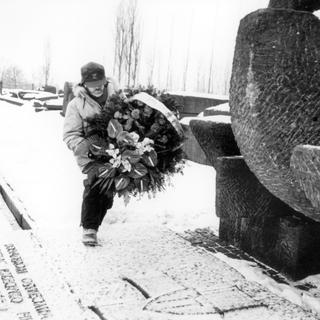


Steven Spielberg, guardian of Holocaust memory
FeatureThe American director set out in the 1990s to collect testimonies from all Holocaust survivors. To date, the foundation he created for this purpose has gathered over 56,000 testimonies worldwide.
It was on the plane back to Los Angeles after filming Schindler's List in Poland, between March and May 1993, that filmmaker Steven Spielberg had the most audacious and ambitious idea of his life. He had just spent three months in Krakow telling the story of Oskar Schindler, the German industrialist and Nazi Party member who managed to save nearly 1,300 Jews by employing them in his enamel and munitions factory during World War II. The filming had been intense, complicated and exhausting. Spielberg, who had waited a decade to make the movie – daunted by the enormity of the subject and its connection to his personal history and Jewish identity – was acutely aware of an immense responsibility. For the first time in his career, he was moved to tears while shooting certain scenes, leading his teams and thousands of extras into a highly realistic vision of the Holocaust's hell.
Yet, the most overwhelming aspect was his encounters with survivors, especially the "Schindler Jews," as those saved at the last minute by working for the industrialist were called. One by one, they arrived on set, intrigued and astonished that a filmmaker dared to tackle a story many of them had never spoken about. And very quickly, they expressed their desire to confide in Spielberg. "Listen to me," they said. "I have a story too, me too!"
The director, focused on his film but touched by this trust, listened, took notes and captured ideas here and there, which he later incorporated into the movie. Of course, all these stories were interesting and immensely valuable, he replied. Of course, they deserved to be heard, preserved and passed on. No survivor should disappear without having shared their personal experience of the Holocaust. It was, in itself, a warning and a message to future generations. In essence, each survivor should become a "teacher."
You have 91.02% of this article left to read. The rest is for subscribers only.
